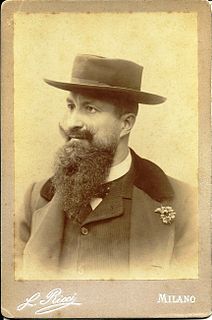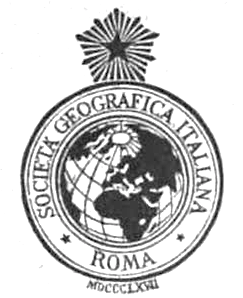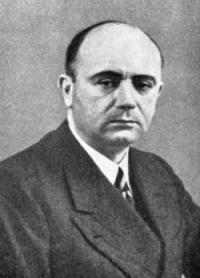
Italian East Africa was an Italian colony in the Horn of Africa. It was formed in 1936 through the merger of Italian Somalia, Italian Eritrea, and the newly occupied Ethiopian Empire, conquered in the Second Italo-Ethiopian War.
The primary languages of Calabria are the standard Italian language as well as regional varieties of the Neapolitan and Sicilian languages, all collectively known as Calabrian. In addition, there are 100,000 Arbëresh-Albanian speakers, as well as small numbers of Calabrian Greek speakers and pockets of Occitan.

The Pontifical Oriental Institute (Orientale), is a Catholic institution of higher education located in Rome. The plan of creating a school of higher learning for Eastern Christianity had been on the agenda of the Catholic Church since at least Pope Leo XIII, but it was only realized in 1917 by Pope Benedict XV (1914-1921). The Orientale forms part of the consortium of the Pontifical Gregorian University and the Pontifical Biblical Institute, both in Rome. All three institutions are run by the Society of Jesus (Jesuits). While the Orientale depends on the Holy See, its management is entrusted to the Society of Jesus. Its Chancellor is the Prefect of the Congregation for the Eastern Churches and its Vice-chancellor is the Superior General of the Society of Jesus, while the Congregation for Catholic Education is the dicastery competent for approving the academic programmes of the Orientale.
Giorgio Levi Della Vida was an Italian Jewish linguist whose expertise lay in Hebrew, Arabic, and other Semitic languages, as well as on the history and culture of the Near East.

Laura Veccia Vaglieri was an Italian orientalist.

The Italian guerrilla war in Ethiopia was a conflict fought from the summer of 1941 to the autumn of 1943 by remnants of Italian troops in Ethiopia and Somalia, in a short-lived attempt to re-establish Italian East Africa. The guerrilla campaign was fought following the Italian defeat during the East African Campaign of World War II, while the war was still raging in Northern Africa and Europe.
Ignazio Guidi was an Italian orientalist. He became Professor at the University of Rome. He is known as a Hebraist and for many translations.
Kafa or Kefa is a North Omotic Language spoken in Ethiopia at the Keffa Zone. It is part of the Ethiopian Language Area, with SOV word order, ejective consonants, etc.
The Istituto Italiano per l'Africa e l'Oriente (IsIAO) in Rome was established in 1995, as the result of the merging of Istituto italiano per il Medio ed Estremo Oriente (IsMEO) with the Istituto Italo-Africano (IIA). It closed in 2012. Its museum collection is now overseen by the Polo Museale del Lazio.

Italians of Ethiopia are immigrants who moved from Italy to Ethiopia starting in the 19th century, as well as their descendants. King Menelik II did not allow the sale of lands belonging to Ethiopia to Italians (Eritrea) and probably allowed France (Djibouti) to solidify his centralized power and have external trading partners. Most of the Italians moved to Ethiopia after the Italian conquest of Abyssinia in 1936. Italian Ethiopia was made of Harrar, Galla-Sidamo, Amhara and Scioa Governorates in summer 1936 and became a part of the Italian colony Italian East Africa, with capital Addis Ababa. and with Victor Emmanuel III proclaiming himself Emperor of Ethiopia.
The University of Lucca was an Italian university located in Lucca (LU), Italy, established in 1785 by the government of the Republic of Lucca. The university disappearing for good in 1867. There had previously been several attempts in the medieval period to found a University of Lucca: On 6 June 1369 Emperor Charles IV granted Lucca a charter for the establishment of a Studium Generale, confirmed on 13 September 1387 by Pope Urban VI. No university was actually founded, but again in 1455 Gonfalonier Giovanni Gigli tried to raise funds for a university, but once more it did not result in an actual institution.
Giovanni Verardi is an Italian archaeologist specialising in the civilisations of central Asia and India. With extensive academic and fieldwork experience, he has published findings about sites in Afghanistan, Nepal, India, and China in particular. Verardi has joined or directed several long archaeological missions to central Asia, and held positions on numerous Italian scientific boards. He has a particular interest in Indian iconography and history.
The Laterza culture or Laterza-Cellino San Marco culture is an Eneolithic culture of Apulia and Basilicata, in Southern Italy. It takes its name from the tombs discovered in the locality of Laterza, near Taranto, and Cellino San Marco, near Brindisi, in Apulia.

Luigi Robecchi Bricchetti was an Italian explorer, geographer, cartographer and naturalist.

The Società Geografica Italiana formed as a geographic society in 1867 in Florence, Italy, and moved to Rome in 1872. As of 1924 it operated from headquarters in Villa Mattei in the Celio rione. The society began publishing a journal in 1868, and also sponsored scientific expeditions, such as one to Ethiopia in 1876, led by Orazio Antinori. In 1892 its members were among the first participants of the triennial Congresso geografico italiano.
Alessandro Bausi is an Italian philologist working on Ethiopic texts and manuscripts. Bausi earned his PhD in 1992 from University of Naples "L'Orientale". Formerly Assistant (1995) and Associate Professor (2002) of Ethiopic Language and Literature at the University of Naples "L'Orientale", since 2009 he is Professor for Ethiopian Studies at the Asien-Afrika-Institut and Director of the Hiob Ludolf Centre at Universität Hamburg. He is considered as one of the leading scholars in his field, and is the editor of the journal Aethiopica: International Journal of Ethiopian and Eritrean Studies and of the series Aethiopistische Forschungen.
Carlo De Simone is an Italian linguist, specializing in Ancient Greek and Latin texts and Etruscan epigraphs. He is best known for his research into Etruscan, Lemnian and Rhaetian languages.

Alessandro Bausani was a scholar of Islam, Arab and Persian studies, interlinguistics and the History of Religion, translating many works into Italian. He was one of the greatest Italian scholars of Islam, as well as a translator and commentator of one of the most important translations of the Qur'an into the Italian language.

The Italian Numismatic Institute is an Italian body for the study of numismatics, based in Palazzo Barberini at 13 via Quattro Fontane.

Matteo Pizzigallo was an italian essayist and historian. He attended La Sapienza University in Rome and graduated in 1972.










